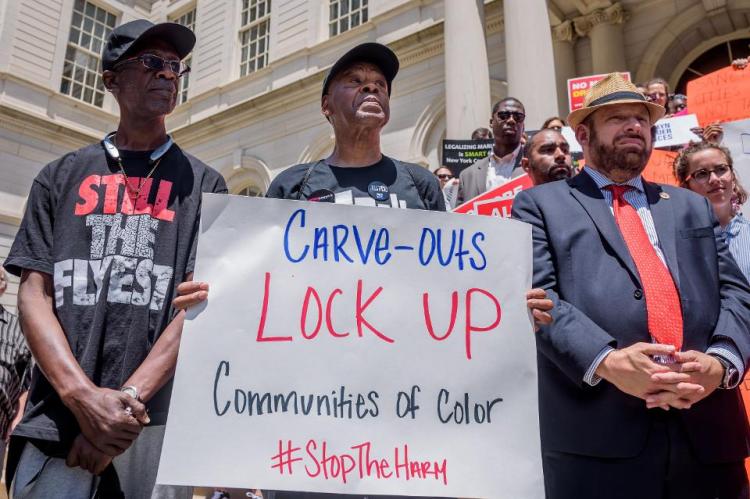Sanders' Cannabis Plan Tackles Vital Need For Equity In Industry's Future
On Thursday, presidential hopeful Sen. Bernie Sanders announced his proposal for legalizing cannabis within three months of taking office.
Unlike many cannabis game-plans to date, including those of many of the industry’s hottest players, Sanders’ proposal puts the issues of full legalization, criminal expungement, and community reinvestment front and center, where they should be.
The proposal focuses on four key areas for moving our country from the height of cannabis criminalization into a safe, productive, equitable industry and future:
- De-scheduling marijuana from the Controlled Substances Act by executive action within 100 days of Sanders taking office, and helping drive legislation to permanently legalize and regulate it.
- Expunging all past marijuana-related convictions, reviewing all current federal and state ones, and funding that process across the country.
- Ensuring that revenues from legal cannabis will be reinvested in Black and Brown communities and others who have been “hit hardest by the War on Drugs” (plus prohibition and forced cultivation before that, among other things), and still are.
- Making sure that legalized marijuana “does not turn into big tobacco.”
See also: National Expungement Week Highlights States' Lack Of Legal Repair Efforts
Weighing the pros and cons of executive action as a lawmaking tool is best left to legal wonks, unlike myself (though this country’s more than once-a-minute marijuana arrest rate may speak for itself).
But the value of the plan’s focus on racial equity, and on repairing prohibition’s harms, is both clear and significant, according to drug reform advocates who advised the campaign.
“We are grateful for the opportunity our team had to work with the Sanders campaign to ensure criminal justice reforms and social equity were at the forefront of his marijuana legalization platform,” said Queen Adesuyi, National Affairs Policy Manager for Drug Policy Action, in a statement.
“It is not enough to just legalize marijuana. We must do it the right way, and that means reinvesting in the communities that have been most harmed by the cruel and inhumane policies brought forth through the war on drugs.”
For other candidates to not consider these components in their platforms would be to deny the harrowing history of how communities of color have been targeted by these policies for the last century.
Queen Adesuyi, National Affairs Policy Manager for Drug Policy Action
“As the country moves to recognize marijuana and drug use in general as a public health issue, it is crucial that communities directly impacted by criminalization are not left to continue suffering from collateral consequences of convictions or left out of legal economic opportunities,” Adesuyi continued.
“For other candidates to not consider these components in their platforms would be to deny the harrowing history of how communities of color have been targeted by these policies for the last century.”
See also: Could Acreage Suits, Canopy Pricing Be Big Cannabis' Wake-Up Call?
The proposal also echoes an increasing call for improvement in an industry which, at its own ongoing peril, continues to lock out history and experience in favor of fresh capital.
For example, to address the current lack of financial and regulatory support for communities most impacted by cannabis prohibition (which seems to fuel today’s big business- and white entrepreneur-heavy cannabis scenes), Sanders’ administration would:
- Create a $20 billion grant program within the Minority Business Development Agency to provide grants to entrepreneurs of color who continue to face discrimination in access to capital.
- With this ... create a $10 billion grant program to focus on businesses that are at least 51% owned or controlled by those in disproportionately impacted areas or individuals who have been arrested for or convicted of marijuana offenses.
- Provide formerly incarcerated individuals with training and resources needed to start their own businesses and worker owned businesses, and guarantee jobs and free job training at trade schools and apprenticeship programs related to marijuana businesses.
The plan would also tackle monopolists and other shady operators with franchise caps, and eliminate current regulations, of which there are many, that allow public agencies to deny people housing, benefits, and the US immigration process because of a marijuana-related criminal record.
In short, as Justin Strekal, Political Director at the National Organization for the Reform of Marijuana Laws (NORML), commented by email, “The Sanders plan represents the first ever federal proposal that would limit the most deleterious impacts of quarterly capitalism hindering the development of a robust and people-centered cannabis economy.”
“By preventing the establishment of monopolies and prioritizing small businesses and rural farmers, this plan will spark a deep conversation about what the future of the legal marijuana industry could consist of,” Strekal said.
Indeed, if Sanders intends to “pile $50 billion” from legal cannabis revenues into business grants overall, as CNBC put it, communities across the country could start to see upsides to this newly legal, potentially equitable and renewable, and inevitably booming industry.
PICTURE TAKEN ON CITY HALL STEPS, NEW YORK, UNITED STATES - 2018/06/20: Advocates, community organizations, and ... [+] Council Members held a press conference and rally at the steps of City Hall, challenging Mayor de Blasio and the NYPDs newly-announced marijuana enforcement policy, urging the Mayor to end racially biased marijuana arrests completely. The Mayor and NYPD Commissioner announced the policy shift yesterday in the culmination of their 30-day review period to assess marijuana enforcement in NYC. (Photo by Erik McGregor/Pacific Press/LightRocket via Getty Images)
LightRocket via Getty Images
- Log in to post comments

